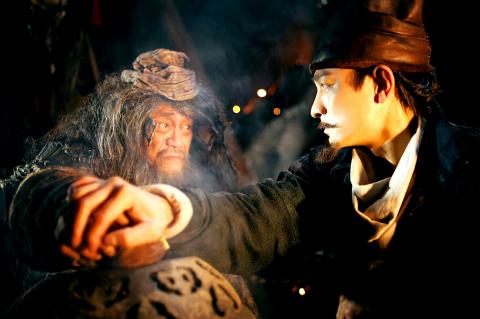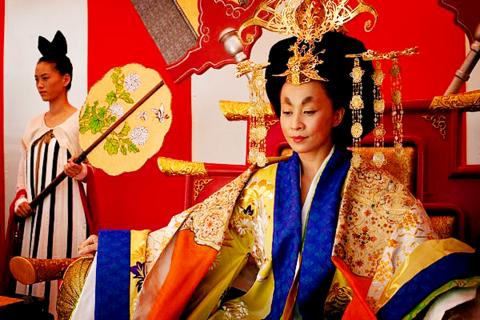Five years after his martial arts flick Seven Swords (七劍) hit movie theaters, Tsui Hark (徐克) returns to kung fu territory with Detective Dee and the Mystery of the Phantom Flame (通天神探狄仁傑), which boasts a stellar cast including Andy Lau (劉德華), Carina Lau (劉嘉玲) and Li Bingbing (李冰冰).
Enhanced by CGI, the highly anticipated film is a period martial arts flick meets whodunit that at times is almost overwhelmed by its visual sumptuousness and special effects.
Set in 690, on the eve of the coronation of empress Wu Zeitan (Carina Lau), China’s first and only female ruler, the story opens inside an enormous, hollow Buddha statue, over 200m tall, that is being erected in front of the imperial court to celebrate the coronation.

Photos courtesy of Huayi Brothers Media
When a chief engineer gives a foreign ambassador a tour inside the statue, the former suddenly bursts into flames and perishes.
Soon a court official riding to the palace to report his findings on the incident suffers the same fate.
Rumors of an ancient curse circulate and the empress follows the advice of the court sage to pardon and recall Di Renjie (Any Lau), a former imperial judge sentenced to hard labor eight years previously for criticizing her.

Photos courtesy of Huayi Brothers Media
Reinstated as a judge, Di sets out to investigate the two deaths with the help of two uneasy allies: marital arts expert and Wu’s protegee Jinger (Li), and hotheaded judicial officer Pei Donglai, played by China’s Deng Chao (鄧超).
The movie progresses at a cracking pace as the trio ventures into strange places like the Phantom Market, an underground city inhabited by ghostly characters, and the Monastery of the Infinite, where the Imperial Chaplain resides.
The mystery is solved bit by bit. Dee dismisses supernatural explanations and blames the deaths on an elaborate scheme to overthrow the empress.
Tsui has a predilection for throwing fantasy and wuxia (武俠) elements together in his films, such as Zu: Warriors From the Magic Mountain (新蜀山劍俠, 1983) and The Legend of Zu (蜀山傳, 2001).
In Detective Dee, magic and mystery are vividly conveyed with imaginative sets like the nightmarish subterranean city, or through eccentric characters such as the Imperial Chaplain, who possesses supernatural powers. With its endless staircases, mechanical gears and a treelike core, the towering interior of the Buddha statue serves as an Escheresque setting for the finale fight, choreographed by veteran action director Sammo Hung (洪金寶).
The computer-generated effects that render Luoyang, the Tang Dynasty capital, as a bustling port city frequented by merchants from across the world at times look distractingly obvious, but the artificiality of the imagery fits the aura of a fantasy.
Though character development is rarely a priority in Tsui’s genre movies, the cast turns in entertainingly generic performances. Carina Lau’s Wu Zeitan is, nevertheless, a big letdown. By reducing the empress’ role to a monarch who simply goes around complaining about how she is despised because she is a woman, the director throws away a great opportunity to explore alternative views of China’s only female monarch, who is often depicted as a Machiavellian tyrant.

June 2 to June 8 Taiwan’s woodcutters believe that if they see even one speck of red in their cooked rice, no matter how small, an accident is going to happen. Peng Chin-tian (彭錦田) swears that this has proven to be true at every stop during his decades-long career in the logging industry. Along with mining, timber harvesting was once considered the most dangerous profession in Taiwan. Not only were mishaps common during all stages of processing, it was difficult to transport the injured to get medical treatment. Many died during the arduous journey. Peng recounts some of his accidents in

“Why does Taiwan identity decline?”a group of researchers lead by University of Nevada political scientist Austin Wang (王宏恩) asked in a recent paper. After all, it is not difficult to explain the rise in Taiwanese identity after the early 1990s. But no model predicted its decline during the 2016-2018 period, they say. After testing various alternative explanations, Wang et al argue that the fall-off in Taiwanese identity during that period is related to voter hedging based on the performance of the Democratic Progressive Party (DPP). Since the DPP is perceived as the guardian of Taiwan identity, when it performs well,

The Taiwan People’s Party (TPP) on May 18 held a rally in Taichung to mark the anniversary of President William Lai’s (賴清德) inauguration on May 20. The title of the rally could be loosely translated to “May 18 recall fraudulent goods” (518退貨ㄌㄨㄚˋ!). Unlike in English, where the terms are the same, “recall” (退貨) in this context refers to product recalls due to damaged, defective or fraudulent merchandise, not the political recalls (罷免) currently dominating the headlines. I attended the rally to determine if the impression was correct that the TPP under party Chairman Huang Kuo-Chang (黃國昌) had little of a

At Computex 2025, Nvidia CEO Jensen Huang (黃仁勳) urged the government to subsidize AI. “All schools in Taiwan must integrate AI into their curricula,” he declared. A few months earlier, he said, “If I were a student today, I’d immediately start using tools like ChatGPT, Gemini Pro and Grok to learn, write and accelerate my thinking.” Huang sees the AI-bullet train leaving the station. And as one of its drivers, he’s worried about youth not getting on board — bad for their careers, and bad for his workforce. As a semiconductor supply-chain powerhouse and AI hub wannabe, Taiwan is seeing